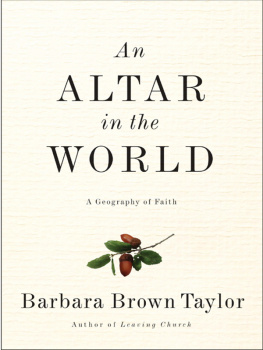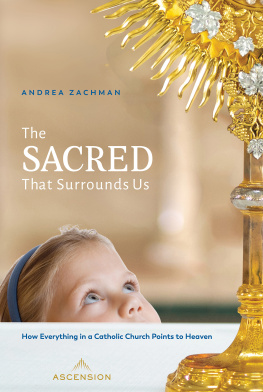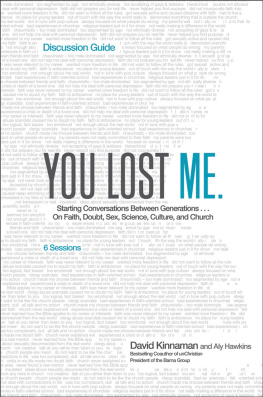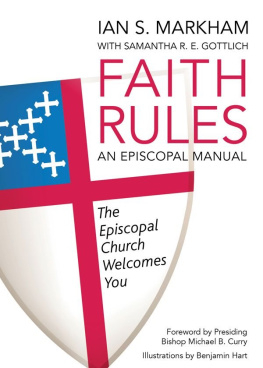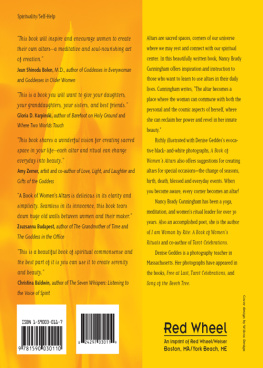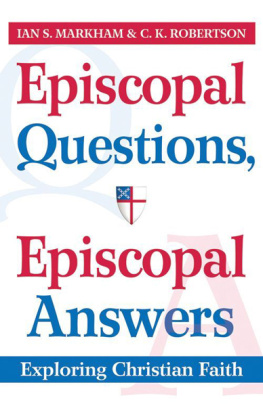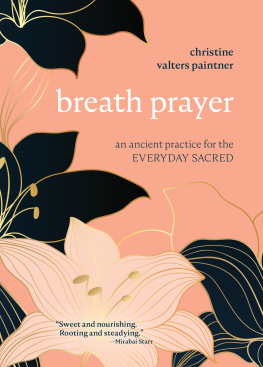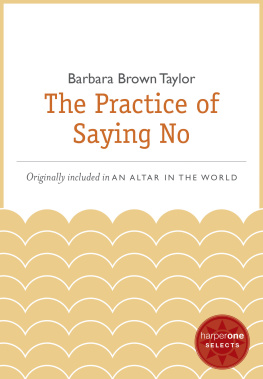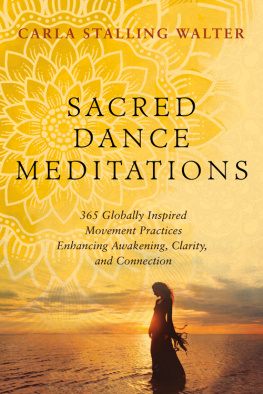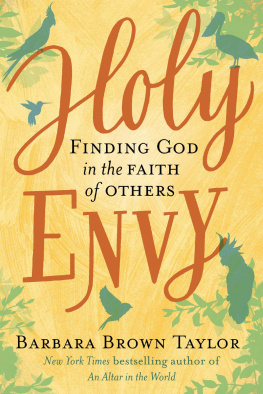For Claire and Kathleen
Contents
The Practice of Waking Up to God
Vision
The Practice of Paying Attention
Reverence
The Practice of Wearing Skin
Incarnation
The Practice of Walking on the Earth
Groundedness
The Practice of Getting Lost
Wilderness
The Practice of Encountering Others
Community
The Practice of Living with Purpose
Vocation
The Practice of Saying No
Sabbath
The Practice of Carrying Water
Physical Labor
The Practice of Feeling Pain
Breakthrough
The Practice of Being Present to God
Prayer
The Practice of Pronouncing Blessings
Benediction
CAPABLE FLESH
The tender flesh itself
will be found one day
quite surprisingly
to be capable of receiving,
and yes, full
capable of embracing
the searing energies of God.
Go figure. Fear not.
For even at its beginning
the humble clay received
Gods art, whereby
one part became the eye,
another the ear, and yet
another this impetuous hand.
Therefore, the flesh
is not to be excluded
from the wisdom and the power
that now and ever animates
all things. His life-giving
agency is made perfect,
we are told, in weakness
made perfect in the flesh.
St. Irenaeus (c. 125c. 210),
adapted and translated
by Scott Cairns1
And when you turn to the right or when you turn to the left, your ears shall hear a word behind you, saying, This is the way; walk in it.
Isaiah 30:21
Seek not to follow in the footsteps of the men of old; rather, seek what they sought.
Gautama Buddha
The whole way to heaven is heaven itself.
Teresa of Avila
I f I had a dollar for every time I heard someone say, I am spiritual but not religious, then I might not be any wiser about what that meansbut I would be richer. I hear the phrase on the radio. I read it in interviews. People often say it to my face when they learn that I am a religion professor who spent years as a parish priest.
In that context, people are usually trying to tell me that they have a sense of the divine depths of things but they are not churchgoers. They want to grow closer to God, but not at the cost of creeds, confessions, and religious wars large or small. Some of them have resigned from religions they once belonged to, taking what was helpful with them while leaving the rest behind. Others have collected wisdom from the four corners of the world, which they use like cooks with a pantry full of spices. Plenty of them are satisfied, too, even as they confess that they are sometimes lonely.
I think I know what they mean by religious. It is the spiritual part that is harder to grasp. My guess is they do not use that word in reference to a formal set of beliefs, since that belongs on the religion side of the page. It may be the name for a longingfor more meaning, more feeling, more connection, more life. When I hear people talk about spirituality, that seems to be what they are describing. They know there is more to life than what meets the eye. They have drawn close to this More in nature, in love, in art, in grief. They would be happy for someone to teach them how to spend more time in the presence of this deeper reality, but when they visit the places where such knowledge is supposed to be found, they often find the rituals hollow and the language antique.
Even religious people are vulnerable to this longing. Those who belong to communities of faith have acquired a certain patience with what is sometimes called organized religion. They have learned to forgive its shortcomings as they have learned to forgive themselves. They do not expect their institutions to stand in for God, and they are happy to use inherited maps for some of lifes journeys. They do not need to walk off every cliff all by themselves. Yet they too can harbor the sense that there is more to life than they are being shown. Where is the secret hidden? Who has the key to the treasure box of More?
People seem willing to look all over the place for this treasure. They will spend hours launching prayers into the heavens. They will travel halfway around the world to visit a monastery in India or to take part in a mission trip to Belize. The last place most people look is right under their feet, in the everyday activities, accidents, and encounters of their lives. What possible spiritual significance could a trip to the grocery store have? How could something as common as a toothache be a door to greater life?
No one longs for what he or she already has, and yet the accumulated insight of those wise about the spiritual life suggests that the reason so many of us cannot see the red X that marks the spot is because we are standing on it. The treasure we seek requires no lengthy expedition, no expensive equipment, no superior aptitude or special company. All we lack is the willingness to imagine that we already have everything we need. The only thing missing is our consent to be where we are.
Many years ago now, a wise old priest invited me to come speak at his church in Alabama. What do you want me to talk about? I asked him.
Come tell us what is saving your life now, he answered. It was as if he had swept his arm across a dusty table and brushed all the formal china to the ground. I did not have to try to say correct things that were true for everyone. I did not have to use theological language that conformed to the historical teachings of the church. All I had to do was figure out what my life depended on. All I had to do was figure out how I stayed as close to that reality as I could, and then find some way to talk about it that helped my listeners figure out those same things for themselves.
The answers I gave all those years ago are not the same answers I would give todaythat is the beauty of the questionbut the principle is the same. What is saving my life now is the conviction that there is no spiritual treasure to be found apart from the bodily experiences of human life on earth. My life depends on engaging the most ordinary physical activities with the most exquisite attention I can give them. My life depends on ignoring all touted distinctions between the secular and the sacred, the physical and the spiritual, the body and the soul. What is saving my life now is becoming more fully human, trusting that there is no way to God apart from real life in the real world.
Every chapter in this book is a tentative answer to the question that priest asked me so many years ago. For want of a better word, each focuses on a certain practice a certain exercise in being human that requires a body as well as a soul. Each helps me live with my longing for More. Each trusts that doing something is at least as valuable as reading books about it, thinking about it, or sitting around talking about it. Who wants to study a menu when you can eat a meal? The chapters do not build on one another in any methodical way. They do not bank on literal truth or promise visible results. Instead, they trust the practices to deliver the wisdom each practitioner needs to know. They trust the body to enlighten the soul.
In a world of too much information about almost everything, bodily practices can provide great relief. To make bread or love, to dig in the earth, to feed an animal or cook for a strangerthese activities require no extensive commentary, no lucid theology. All they require is someone willing to bend, reach, chop, stir. Most of these tasks are so full of pleasure that there is no need to complicate things by calling them holy. And yet these are the same activities that change lives, sometimes all at once and sometimes more slowly, the way dripping water changes stone. In a world where faith is often construed as a way of thinking, bodily practices remind the willing that faith is a way of life.

